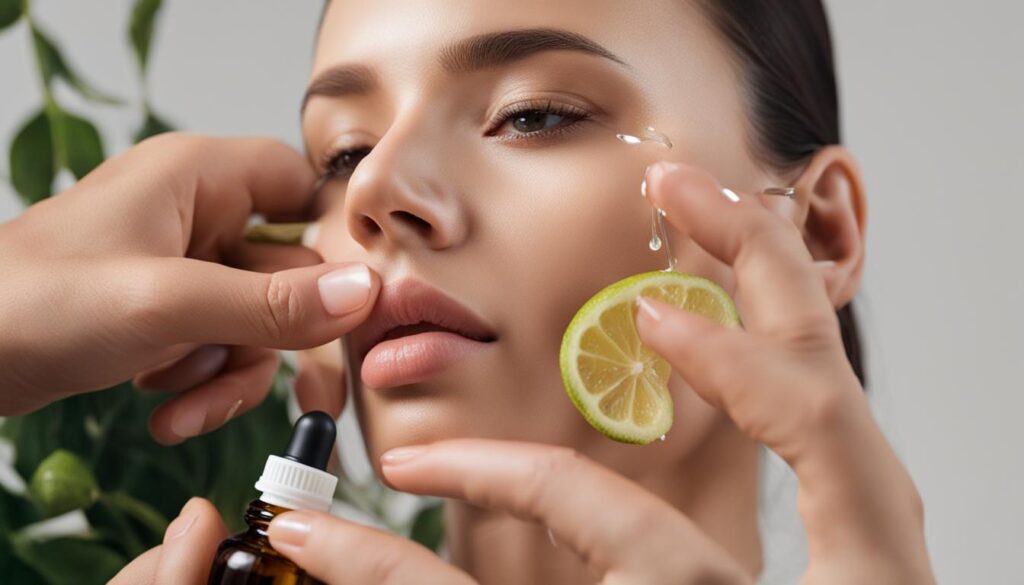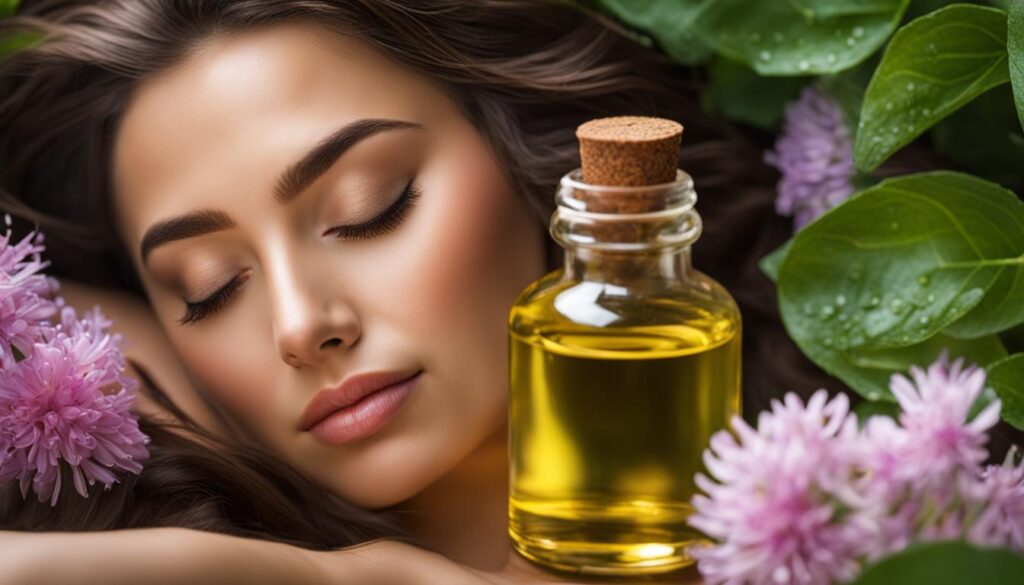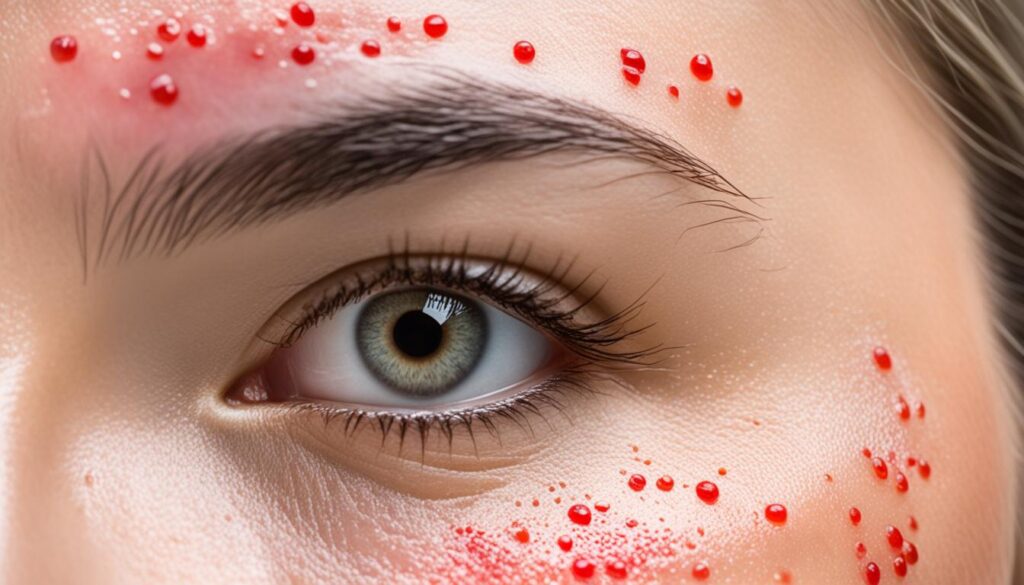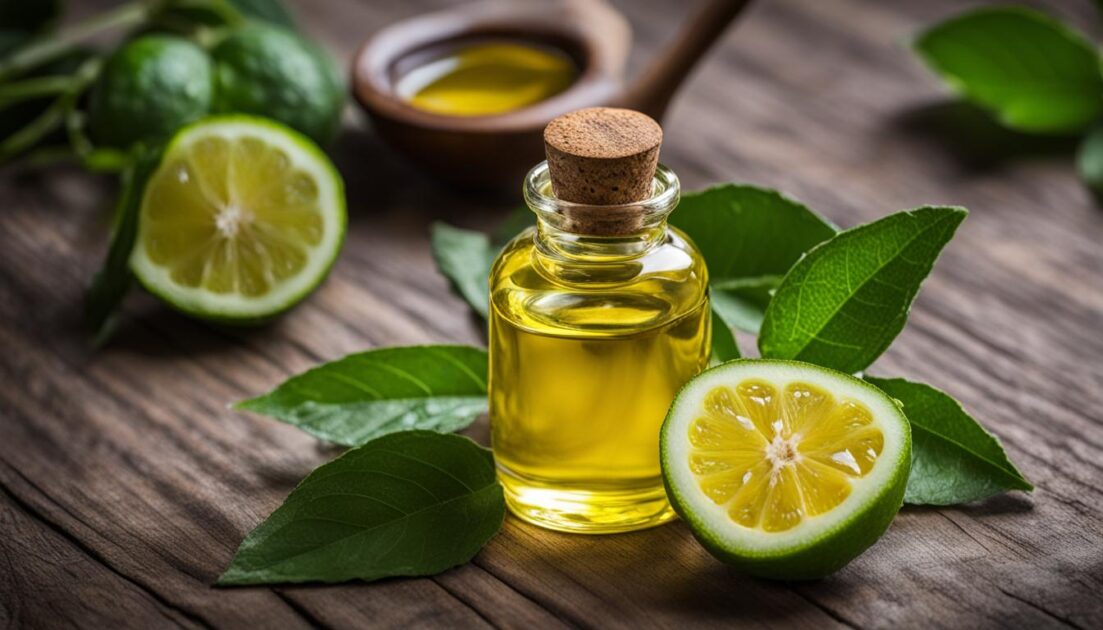Bergamot oil is a versatile essential oil extracted from the rinds of citrus fruit. It offers a plethora of potential benefits and uses for the skin, making it a popular choice in skincare products and aromatherapy treatments.
When applied topically, bergamot oil can help improve acne, brighten the skin, and aid in healing. Its soothing scent and spicy taste make it a delightful addition to various skincare formulations. However, it’s important to note that proper dilution with a carrier oil and patch testing for allergic reactions are essential precautions before using bergamot oil on your skin.
Key Takeaways:
- Bergamot oil offers a wide range of potential benefits for the skin.
- It can improve acne, brighten the skin, and aid in healing.
- Proper dilution with a carrier oil is necessary before applying bergamot oil to the skin.
- Perform a patch test to check for any allergic reactions.
- Bergamot oil can be used in skincare products and aromatherapy treatments.
How to Use Bergamot Oil for Skin
To harness the benefits of bergamot oil for your skin, it is essential to know how to use it properly. Follow these steps to ensure a safe and effective application:
- Dilute with a carrier oil: Before applying bergamot oil to your skin, it is crucial to dilute it with a carrier oil like olive oil. This helps prevent any skin irritation or allergic reactions. A recommended dilution ratio is 1-2 drops of bergamot oil per tablespoon of carrier oil.
- Perform a patch test: Before using bergamot oil on a larger area of your skin, it is important to perform a patch test. Apply a small amount of the diluted oil to a small patch of skin and wait for 24 hours to check for any adverse reactions. If no redness, swelling, or discomfort occurs, it is generally safe to use on a larger surface area.
- Target specific skin concerns: Once you have confirmed the suitability of the bergamot oil for your skin, you can target specific concerns by applying it topically. Gently massage the diluted oil onto acne-prone areas, small wounds, or areas of skin inflammation. Bergamot oil possesses antibacterial, anti-inflammatory, and wound-healing properties that can help improve these conditions.
- Incorporate into skincare products: You can also enhance the effectiveness of your skincare routine by adding bergamot oil to products like body wash and shampoo. This allows you to enjoy the benefits of the oil while cleansing and pampering your skin.
Remember: It is always advisable to consult with a dermatologist before incorporating any new skincare product or ingredient into your routine, especially if you have sensitive skin or existing skin conditions.
By following these guidelines, you can harness the power of bergamot oil for your skin effectively and safely.

Benefits of Diluting Bergamot Oil with a Carrier Oil
Diluting bergamot oil with a carrier oil like olive oil provides numerous advantages. Carrier oils serve as a vehicle for safely delivering essential oils to the skin, allowing for better absorption and reducing the risk of irritation. In the case of bergamot oil, dilution helps prevent potential adverse reactions, such as skin irritation and photosensitivity.
Bergamot oil is classified as a phototoxic oil, which means it can cause skin sensitivity to sunlight if used undiluted or in excessive amounts. By diluting it with a carrier oil, you create a safer formulation that can be used on the skin without any harmful effects.
| Benefits of Diluting Bergamot Oil | Explanation |
|---|---|
| Safe application | Dilution reduces the risk of skin irritation and photosensitivity. |
| Better absorption | Carrier oils help essential oils penetrate the skin for maximum benefits. |
| Improved spreadability | Carrier oils allow for easier application and distribution of essential oils on the skin. |
| Lower concentration | Dilution ensures a milder concentration of bergamot oil, suitable for direct application. |
Bergamot Oil for Skin: Aromatherapy and Mental Health
Bergamot essential oil is known for its therapeutic benefits in aromatherapy, particularly for its soothing effects on mental health. The oil, when mixed with a carrier oil, can be used to create body lotions and massage oils, providing a luxurious and calming experience.
The aromatic qualities of bergamot oil make it a popular choice for adding to body wash, shampoo, and facial scrubs. Its fresh and uplifting scent can enhance the sensory experience of these everyday skincare routines.
One of the most effective ways to enjoy the calming and uplifting effects of bergamot oil is through inhalation. Vaporizers can be used to diffuse the oil into the air, creating a pleasant and relaxing atmosphere. Alternatively, a few drops of bergamot oil can be added to a bandana or handkerchief and used as a personal scent that can be inhaled throughout the day.

“The scent of bergamot oil can have a profound impact on our emotions and mental well-being. Its citrusy and floral aroma helps to uplift our mood, reduce stress, and promote relaxation.”
Research has shown that bergamot oil may have beneficial effects on mental health as an adjunct therapy. Several studies have explored its potential to reduce anxiety, improve mood, and alleviate symptoms of depression. However, further research is needed to determine the effectiveness and safety of using bergamot oil for mental health on a larger scale.
When using bergamot oil for aromatherapy or any other application on the skin, it is important to ensure proper dilution with a carrier oil and perform a patch test to check for any allergic reactions. This precaution ensures the oil can be safely incorporated into a skincare routine to support mental well-being and overall skin health.
Bergamot Oil for Skin: Acne Treatment and Healing
Bergamot oil is a powerful natural remedy that offers numerous benefits for the skin, including its ability to treat acne and aid in skin healing. This essential oil contains compounds with immunomodulatory, wound-healing, and anti-inflammatory properties, making it an effective solution for acne-prone skin.
When diluted with a carrier oil, such as jojoba oil or coconut oil, bergamot oil can be directly applied to acne-prone areas. Its antimicrobial and anti-inflammatory properties help reduce inflammation, control oil production, and prevent bacterial growth, thereby improving acne symptoms.
To use bergamot oil for acne treatment, follow these steps:
- Dilute 2-3 drops of bergamot oil with 1 teaspoon of a carrier oil.
- Perform a patch test on a small area of skin to check for any adverse reactions or allergies.
- If the patch test is successful, apply the diluted bergamot oil to acne-affected areas using a clean cotton swab or your fingertips.
- Leave it on overnight for best results.
- Repeat this process daily until the acne clears up.
It’s important to note that bergamot oil should only be used on non-sensitive skin, as it can cause skin irritation or photosensitivity in some individuals. If you have sensitive skin, it’s recommended to consult with a dermatologist before using bergamot oil.
In addition to treating acne, bergamot oil is also known for its skin healing properties. It can aid in the healing process of small cuts, wounds, and blemishes by promoting cell regeneration and reducing inflammation. Homemade skincare products, such as healing balms or serums, can be made by combining bergamot oil with other natural ingredients like aloe vera gel, vitamin E oil, or shea butter.
Quotes:
I’ve been using bergamot oil for my acne for a few weeks now, and I’ve noticed a significant improvement. It helps calm down the inflammation and reduce the appearance of blemishes. Definitely worth trying for anyone struggling with acne.
Bergamot oil has been a game-changer for my skin healing process. I had a small cut on my face, and after applying diluted bergamot oil for a few days, it healed much faster than I expected. I’m amazed at the healing properties of this oil.

Homemade Skincare Recipes with Bergamot Oil
| Homemade Skincare Recipe | Ingredients | Instructions |
|---|---|---|
| Bergamot Oil Face Mask |
|
|
| Bergamot Oil Spot Treatment |
|
|
By incorporating bergamot oil into your skincare routine, you can experience the benefits of this natural remedy for acne treatment and skin healing. Remember to always perform a patch test before using any new oil on your skin and consult a dermatologist if you have any concerns or allergies.
Bergamot Oil for Skin: Brightening and Healing Properties
Bergamot oil is a versatile ingredient that offers numerous benefits for the skin. Not only does it have brightening properties that can help even out the complexion and reduce the appearance of hyperpigmentation, but it also possesses remarkable healing properties that can aid in the treatment of various skin conditions.
When it comes to brightening the skin, bergamot oil works by stimulating the renewal of skin cells and redistributing skin pigments. This process ultimately leads to a more even and toned complexion. Whether you’re dealing with dark spots, sun damage, or an overall dull appearance, bergamot oil can be a valuable addition to your skincare routine.
Additionally, bergamot oil is known for its antifungal and antimicrobial properties, which make it an excellent choice for healing skin conditions such as eczema and dermatitis. Its antibacterial and anti-inflammatory effects can soothe redness and inflammation, providing relief for irritated skin.
To harness the brightening and healing properties of bergamot oil for your skin, consider incorporating it into your skincare formulations. Whether you prefer lotions, serums, or facial masks, bergamot oil can be a beneficial ingredient for promoting healthy skin and addressing various skin concerns.
Bergamot Oil for Skin Brightening
The brightening properties of bergamot oil can help even out the skin tone and reduce the appearance of hyperpigmentation. By stimulating skin cell renewal and redistributing skin pigments, bergamot oil can provide a more even and toned complexion.
Bergamot Oil for Skin Healing
Bergamot oil possesses antifungal and antimicrobial properties, making it useful in healing skin conditions such as eczema and dermatitis. Its antibacterial and anti-inflammatory effects can soothe redness and inflammation associated with these conditions, promoting healthier and more comfortable skin.
| Bergamot Oil Benefits for Skin | Skin Brightening | Healing Properties |
|---|---|---|
| Brightens the skin tone | Yes | |
| Reduces hyperpigmentation | Yes | |
| Stimulates skin cell renewal | Yes | |
| Redistributes skin pigments | Yes | |
| Has antifungal properties | Yes | |
| Has antimicrobial properties | Yes | |
| Soothes redness and inflammation | Yes |
Bergamot Oil for Hair: Softening and Scalp Health
Bergamot oil is favored by those looking to soften and tame their hair, particularly those with curly hair. It can add shine to dull and dry hair, reducing frizz and breakage. When applied to the scalp, bergamot oil stimulates skin cell renewal and helps remove dead skin cells, promoting a healthier scalp and stronger hair growth. The Vitamin C present in bergamot oil protects the hair against oxidative stress and stimulates collagen production, contributing to thicker and healthier hair growth over time. It can be added to shampoo or mixed with carrier oils like coconut oil for a nourishing scalp treatment.
“Bergamot oil stimulates skin cell renewal and helps remove dead skin cells.”
-Haircare Expert
Blending Bergamot Oil with Other Essential Oils
Bergamot oil can be easily blended with other essential oils, offering a wide range of possibilities for creating custom skincare formulations and aromatherapy blends. One popular pairing is bergamot oil with lavender oil, which is renowned for its skincare benefits and acne-fighting properties. The combination of these two oils can help soothe skin inflammation and promote a healthier complexion.
Tea tree oil, known for its antibacterial properties, can also be blended with bergamot oil to create an effective acne-fighting blend. This combination not only helps combat acne-causing bacteria but also provides a refreshing and invigorating scent.
For those seeking a calming and uplifted effect, blending chamomile oil with bergamot oil is a wonderful choice. Chamomile oil is well-known for its soothing properties, making it an ideal complement to bergamot oil in aromatherapy blends or skincare formulations.
When blending essential oils containing bergamot oil, it is important to consider the proportions and dilution ratios to achieve the desired scent and therapeutic benefits. It is recommended to perform patch tests before trying new oil blends to ensure compatibility with your skin. Additionally, using carrier oils to dilute the essential oil blend can help safeguard your skin from any potential irritation.
FAQ
What are the benefits of using bergamot oil for the skin?
Bergamot oil has numerous benefits for the skin, including its ability to improve acne, brighten the skin, and aid in healing. It can also be used as an ingredient in homemade skincare products.
How should I use bergamot oil on my skin?
To use bergamot oil on the skin, it is recommended to dilute it with a carrier oil, such as olive oil, before applying. A patch test should be performed on a small area of skin before using it on a larger surface area.
Can bergamot oil be used for aromatherapy and mental health?
Yes, bergamot essential oil is well-known for its use in aromatherapy treatments, particularly for its soothing effects on mental health. It can be mixed with a carrier oil to create a body lotion or massage oil, or added to body wash, shampoo, and facial scrubs for its aromatic qualities.
Is bergamot oil effective for treating acne and aiding in skin healing?
Yes, bergamot oil contains compounds that have immunomodulatory, wound-healing, and anti-inflammatory properties, making it suitable for treating acne and aiding in skin healing. It should be diluted with a carrier oil before directly applying it to pimples, cysts, cuts, and blackheads.
Can bergamot oil brighten the skin and help with skin healing?
Yes, bergamot oil has brightening properties and can help even out the skin tone and reduce the appearance of hyperpigmentation. It also has antifungal and antimicrobial properties that can aid in healing skin conditions such as eczema and dermatitis.
Can bergamot oil be used for hair care?
Yes, bergamot oil can soften and tame the hair, particularly for those with curly hair. It can add shine to dull and dry hair, reduce frizz and breakage, and stimulate scalp health and hair growth.
How can I blend bergamot oil with other essential oils?
Bergamot oil blends well with other essential oils, allowing for custom skincare formulations and aromatherapy blends. It pairs well with lavender oil, tea tree oil, and chamomile oil for various benefits and effects. Proportions and dilution ratios should be considered when blending essential oils containing bergamot oil.






